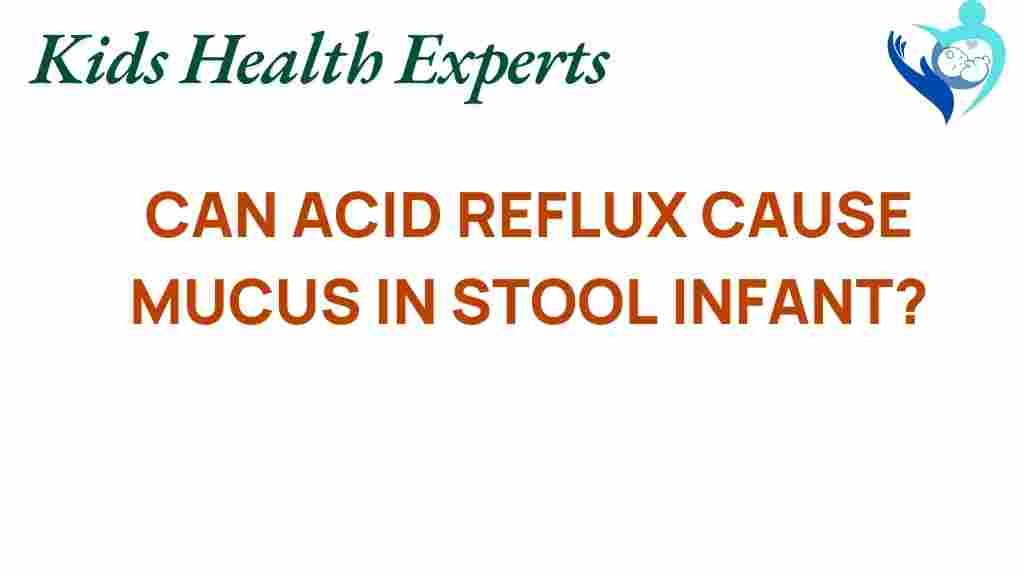Unraveling the Mystery: Can Acid Reflux Cause Mucus in Infant Stool?
As parents, we often find ourselves grappling with the various challenges that come with raising an infant. One common concern that many parents face is the health of their baby’s digestive system. Among the many digestive issues, acid reflux is a frequent topic of discussion, often leading to questions about its effects on infant stool, particularly regarding the presence of mucus. In this comprehensive article, we will explore the relationship between acid reflux and mucus in infant stool, delve into gastrointestinal health, and provide valuable insights for pediatric care.
Understanding Acid Reflux in Infants
Acid reflux, also known as gastroesophageal reflux (GER), occurs when the contents of the stomach flow back into the esophagus. This condition is relatively common in infants and can manifest in various ways, including:
- Spitting up or regurgitation
- Frequent irritability or fussiness
- Difficulty feeding or refusing to eat
- Arching of the back during feeding
While acid reflux is typically a benign condition that many infants outgrow, it can lead to discomfort and other gastrointestinal health issues if not addressed promptly. Understanding reflux symptoms is essential for identifying whether your baby is experiencing acid reflux.
The Link Between Acid Reflux and Mucus in Infant Stool
One of the more perplexing questions for parents is whether acid reflux can cause mucus in their infant’s stool. Mucus is a slippery, gelatinous substance produced by the lining of the intestines, and while its presence in stool can be concerning, it can occur for several reasons:
- Infection or inflammation in the gastrointestinal tract
- Food allergies or intolerances
- Changes in diet or formula
- Acid reflux and the resultant irritation of the intestinal lining
Research suggests that while acid reflux itself may not directly cause mucus in infant stool, it can contribute to gastrointestinal discomfort that might lead to changes in stool consistency. If your baby is experiencing reflux symptoms, this discomfort may prompt the body to produce more mucus as a protective mechanism, leading to the presence of mucus in the stool.
Step-by-Step Process: Identifying Mucus in Infant Stool
To determine if your baby’s stool contains mucus and to understand the possible implications, follow these steps:
- Monitor Stool Patterns: Keep track of your baby’s bowel movements. Note the frequency, consistency, and color of the stool.
- Look for Changes: If you notice a significant increase in mucus, observe if there are accompanying symptoms such as diarrhea, vomiting, or changes in appetite.
- Consult Your Pediatrician: If you suspect that mucus is present in your baby’s stool, especially if accompanied by other reflux symptoms, make an appointment with your pediatrician for a thorough evaluation.
Troubleshooting Tips for Parents
Managing acid reflux and any resulting digestive issues can be challenging for parents. Here are some troubleshooting tips to help navigate these concerns:
- Keep a Log: Maintain a diary of your baby’s feeding times, types of food or formula consumed, and any reflux symptoms observed. This can help identify triggers.
- Adjust Feeding Position: Hold your baby upright during and after feedings to minimize the likelihood of reflux.
- Consult a Specialist: If your baby’s reflux symptoms are severe, consider consulting a pediatric gastroenterologist for specialized care.
- Evaluate Diet: If breastfeeding, consider monitoring your diet for potential allergens. If formula feeding, consult your pediatrician about trying a hypoallergenic formula.
When to Seek Medical Attention
While many cases of acid reflux in infants resolve on their own, there are certain signs that warrant immediate medical attention. Be vigilant for:
- Severe or persistent vomiting
- Signs of dehydration (such as dry mouth, crying without tears, or significantly fewer wet diapers)
- Blood in the stool or vomit
- Failure to gain weight or poor growth
If you observe any of these symptoms, it is crucial to contact your pediatrician as soon as possible.
Conclusion: Prioritizing Your Baby’s Digestive Health
In conclusion, while acid reflux can contribute to gastrointestinal discomfort in infants, it is not a direct cause of mucus in infant stool. However, the presence of mucus can indicate other underlying issues that require attention. Maintaining a keen eye on your baby’s digestive health, understanding reflux symptoms, and seeking appropriate pediatric care are essential steps in ensuring your baby’s overall well-being.
For more information on digestive health in infants, consider visiting the American Academy of Pediatrics for reliable resources. Remember, as a parent, your observations and instincts are invaluable when it comes to your baby’s health.
Always consult with your pediatrician for personalized advice and recommendations tailored to your child’s unique needs. Your active involvement in monitoring and addressing digestive issues will contribute significantly to your baby’s health and happiness.
This article is in the category Conditions and created by KidsHealthExperts Team
